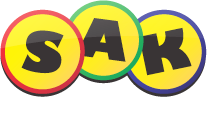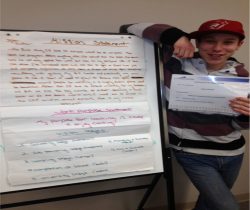ICS TO THE MAX!
MAX BURGERS AND THE IMPLICIT CAREER SEARCH (ICS)
“Max Burgers, Sweden’s oldest, most popular and most profitable restaurant chain, has over 3,000 employees in their 86 restaurants. They incorporated ICS into their management-training program in 2008. The restaurant industry typically has a high turnover rate and Max looked at ways of retaining their staff, especially the management team that they have invested time and resources with already. Max wanted to use ICS, not as part of the interview process, but working with potential managers to see if the management program was REALLY what they wanted to do as the next stage of their career. Max made it very clear that they would support the individual should they find that their true career path would take them in a different direction.
When we started using the ICS workshop within our high potentials program (Team 20) there were only about 50% of the trainees that became restaurant managers, and only about 20% that stayed on as managers. The rest went back to their local town and back to their old job as assistant manager. Max wants to expand not only in Sweden but also in the rest of the world, but to do that we have to have many good managers. That’s when we got in touch with the ICS program. We liked the program from the start because it promoted courage and self-awareness. That’s exactly what these young men and women needed. By answering the two questions of Personal Mission Statement and Work Purpose, people made their decision and then stuck with it. They made a clear plan of what they wanted to be in the future.
| Pre-ICS | Post-ICS | |
|---|---|---|
| % of trainers becoming managers | 50 | 85 |
| % of trainers remaining with Max | 20 | 70 |
| Average training time to become a manager | 2 years | 1 year |
Today 85% of all Team 20 members become a restaurant manager and almost 70% stay at their first assignment. Because of the ICS workshop we have cut training time in half. But the most important change is the drive and ambition that people attending the program are showing us. They have, in a few days, come to realize that “I am the one and only person responsible for my development”, and that makes a world of difference. They have decided what they want and they are going for it.”
Jonas Aspenfjall
General Manager Operations
Max Burgers, Stockholm, Sweden
ICS GETS FUNNY
CLIENT SAK Theatre Company, Orlando, Florida
BACKGROUND
SAK Theatre began in 1977 as a touring company, presenting audience participation shows at fairs across the U.S. In 1982 they were approached by Walt Disney World in Florida to present these shows on a full time basis at their EPCOT theme park. SAK suddenly became a corporation and moved its base of operations to Florida, where they provided shows for Disney as well as festivals and EXPOs around the world. The Disney contract ended in 1990 and the core ensemble of SAK opened their first retail venue; The SAK Comedy Lab in downtown Orlando, Florida.
This exciting new venture brought with it a lot of conflicting opinions and visions of its future, so the SAK team called upon ICS for guidance.
PROCESS
The SAK leadership team participated in a 3 Day Human Element Workshop designed to increase self-awareness and self-esteem and to promote open communication between the leaders.
This was followed up by a 5 day Implicit Career Search workshop that included the leadership team and all SAK performance staff (total of 32 participants). This workshop encouraged open communication between all SAK staff and also guided each participant to develop their own Implicit Career Plan. Staff were then encouraged to compare the personal work purpose they developed during ICS to the mission statement of SAK Theatre to see if it aligned. At this point two staff members became clear that their work purpose would not be served by working at SAK and each of them made plans to develop their careers outside of the company. They continue to be active supporters and patrons of SAK and its ideals.
The next workshop was a 2-day Strategic Planning session where the leadership crew plotted SAK’s future. This resulted in the decision to send a number of the team from Orlando to Los Angeles.
OUTCOME
SAK Theatre is about to celebrate its 40th anniversary and is a mainstay of the Orlando entertainment scene. The individuals who headed to LA all experienced varied and different levels of success as indicated in the results grid in the appendix.
RESULTS
See Appendix 3 ‘SAK Individual Follow Up’

Co-written by Clare Sera, one of the SAKtors, who participated in ICS, and moved to LA to become a successful screenwriter.
FROM JAIL CELL TO FIVE STAR CHEF
CLIENT
Surrey Pretrial Centre, Ministry of Justice, Adult Custody, Corrections Branch, BC Public Service.
BACKGROUND
ICS facilitator, Tedd Haddock, received an inquiry about the program from Fred Stratton, Acting Deputy Warden for the Pretrial Centre in Surrey BC. Acting Deputy Stratton had heard about ICS and was eager to test it with some of his inmates. After consultation with Ted and Steve Miller he implemented a strategy to reward twelve prisoners with participation in the 5 day ICS program. Three months later, the 12 successful candidates were announced. They were also charged $10 to take the program.
PROCESS
Ted and Steve co-facilitated the program and were met with a very enthusiastic group of participants. Acting Deputy Stratton had done an excellent job in setting the workshop up to be a success. Discussions were lively and forthright and all the workshop activities were participated in fully by all participants. At the end of the week each participant presented the contribution they would make to society upon leaving the prison, in the form of the ICS Career Plan. Stratton attended the presentations and also talked about how being around the workshop had inspired him to live up to his own Personal Mission Statement, which he shared with the group.
OUTCOME
All participants competed a career plan by the end of the week and, although we were unable to follow up with the participants, one of them s connected with Steve after being released from the centre. Here is the email he sent:
“Just wanted to thank you for helping me change my life. My name is XXXXXXXX. I was a participant in your pilot project with a corrections facility. The program made me realize what my essence was and to think about my legacy. Wish you are doing well. And if you ever needed testimonial or reference for how powerful the work you are doing, do not hesitate to contact me.”
This individual contacted Steve again a short time later to say that he had followed the career plan he developed in prison and was now a head chef at a prestigious restaurant in downtown Vancouver. Steve and Tedd were subsequently treated to a delicious four-course meal, courtesy of the chef! He did give us permission to use his full name and we have decided not to in case it hampers his future career path in any way. He has spoken about ICS at a number of events.
SAMPLE PARTICIPANT COMMENTS
The most striking part of the evaluations was the fact that ten out of twelve participants commented that the concept of ‘essence’ was the most important part of the program for them, other comments:
- “Thanks for coming and teaching us it is going to help me be successful in life.”
- “I am happy with this program, it has a very effective way to deliver its message, and I will use these tools for ever.”
- “This course helped me ‘identify my essence’ and gave me the guidance and tools to become a more respectful, focused, confident, & aware person.”
- “This course allowed me to recognize that positive outcomes in life are more possible if you practice different strategies.”
RESULTS
THE MODEL CLIENT
CLIENT Chase Employment Centre, Employment Program of BC
BACKGROUND The Chase Employment Centre (CEC) decided to begin a 6 month Work Placement Program with a 5-day Implicit Career Search workshop. The goal of the overall program was to provide a group of first nations youth with some basic employment skills and, for most, their first experience with formal work. ICS was included with the intentions of providing the participants with motivation, self-esteem and a long-term career plan that would not only assist in determining where the job placements would take place but would help the participants plan for work life beyond the program.
PROCESS Dylan, a nineteen year old who, to this point, had experienced life in a number of foster homes, quickly became the leader of the group and not always in a positive fashion. He was skeptical about the overall program in general and the five days of sitting around in a classroom doing ICS in particular. “Why not just get out to work?” he would often plea. He challenged every premise of the program; “What does self-esteem or feelings have to do with finding a job?” “Why plan when we have no idea what is going to happen to us?” As the program progressed the facilitator began to recognize a sharp and inquiring intelligence behind Dylan’s questions and challenges. When Module 3 (Personal Definition) began, Dylan’s curiosity increased and his skepticism lessened.
The concept of him deciding what kind of a person he would be was at first novel then became an epiphany of sorts. He felt the freeing power of self-determination and realized that he could choose his life, and his self-concept, to a far greater degree than he had previously thought.
OUTCOME Dylan formed a career plan by the end of the workshop and, as you can see in the accompanying picture, proudly presented it to his peers in the group and to the employment facilitators at the agency. He completed a placement at an A&W restaurant and after that took a full-time job at Subway Restaurants, then Wendy’s.
Dylan is now a successful male model, also working in security to augment his income.
The other seven participants also completed their career plans, took job placements and went on to independently follow their career plans after the placement program ended. One of the most poignant statements made during the ICS portion was from the youngest member of the group who, on the morning check-in of the second day, said “This is the first workshop I have taken that is about me! It helps me understand me!”
SAMPLE PARTICIPANT COMMENTS
- “This course is awesome! I never knew so much about me and that there is so much about me that I can use to make my career plan. My first career plan!”
- “I learned that I had lost hope in myself and the world. I learned that there is much more to me than meets the eye. I learned that I have been letting negative people control me.”
- “I have skills that can help others.”
DYLAN’S MANTRA
Asked to sum up his learning from ICS Dylan responded: “Life is precious and every turn is a new lesson to learn. It is really a beautiful thing.”
RESULTS
uk_implicit_career_search_report
The Model Dylan
Future of Work in Corporations
“The very idea of broadening one’s loyalties and affiliations beyond the narrow confines of the marketplace and nation-state to include the human species and the planet is revolutionary and portends vast changes in the structuring of society.” Jeremy Rifkin
The future worker will be one who has been educated to base her work-life on offering a solution to a societal problem. She will have chosen her education not to acquire a Master’s or a Ph. D., but to gain the information and skills required to work on the contribution she has defined in her work purpose. Through a self-selected combination of schooling, training and work experience she will have learned to market her skills and deliver her work in a variety of ways from a number of different venues: a home office that is ‘wired’ to other offices of her various colleagues; a meeting space designed to promote creativity in her hometown; an onsite factory or laboratory; etc. She will not have set hours, or income, and will adjust her work-life in harmony with her other pursuits; family; fitness; play; etc.
You are probably thinking of a few people who are close to living this lifestyle already, they are the pioneers of the future of work and they are thriving in some of the areas mentioned and struggling in others. Their struggle is made up of: a.) Struggle being an ongoing aspect of the future of work, the heroic journey to contribute, to participate positively. b.) This is not an accepted work style in our present culture, pressure is there to get a degree, pension, position, set hours, etc. When all is well with our hero’s work situation she feels ahead of the curve, in charge of her life, a contributor. When things start to flounder, the pressure to conform mounts and the required self-esteem and self-confidence to operate at the Leader/Expert level is depleted.
Many of today’s large corporations are struggling to retain young workers and to fill the spaces left open by the retirement of the baby boomers. Corporations are born of the industrial age and, while a few of them are trying to adapt to an information age approach they are still deeply rooted in traditional thinking. They see it as having worked for them up till now so why change? Industrial age motivation is based on:
Monetary Rewards
Luxury of life
Ease of life
Security
It makes sense from this perspective that in order to entice and retain young workers the company will have to:
Pay them more
Provide more holiday time
Let them work at home and/or provide daycare
Offer attractive retirement incentives
Many dollars and hours are spent on generating ‘creative’ ways to market these incentives. This is simply wrapping the old mind set in new packaging and it will not have the impact hoped for.
The primary motivator to inspire the youth of this generation to work for you is the same as it has always been, it is just becoming more apparent to them than it was to previous generations, – purpose. The primary reason kids are staying at home longer, playing video games, not willing to work for minimum wage will seem financial to an industrial mindset but it is not. Kids are suffering from ‘purpose paralysis’ they are finding it tougher to motivate themselves to work solely for the money and even tougher to work for a company they see as a contributor to the downfall of the environment.
The primary motivator to work is and always has been contribution, for individuals and companies alike. It is the background that the other motivations (money, security, legacy, etc.) are placed upon and sometimes we forget it is in the background as we focus on the immediate needs presented by those secondary ones.
Working on the assumptions that all individuals have a contribution to make and want to make that contribution is one that has served me very well in working with clients who do not always present the way you would expect a contributor to. It will also work well with corporations. A long time unemployed individual may appear to be lazy, ill mannered and manipulative to the untrained eye. When challenged to define and deliver his contribution that individual transforms into an energetic, conscientious and enthusiastic participant in the human race. A corporate entity may appear on the surface to be greedy, exploitative and callous. Once persuaded to align its company mission with the positive evolution of the planet this company will transform into a planetary leader.
It may be ironic that both the individual and the company will be persuaded to make this transformation because by working on purpose they will actually become more content with their level of income/profit, achieve sustainability, and leave a legacy they are proud of.
To begin this transition a company will view itself as ‘working on purpose.’ Like the individuals we have described earlier in this book, the company has some potential and some rough spots; some strings of development at a high altitude and some at a low; some beliefs that are helpful and some that are hindering. And, just like our individuals, it can effectively work on purpose by reviewing and adjusting its:
Decision Making (How it actually makes decisions as compared to how it wants to.)
Personal Development (To develop individuals that feel significant, competent, and likable within the company.)
Company Definition (Does the mission statement emphasize contributing?)
Career Definition (A process to encourage staff to align their individual work purposes to the companies mission statement? This process will accommodate individual work purposes that will further develop the companies mission
Career Development (Moving the center of gravity of the culture from Craftsperson – Manager – Leader – Expert – Creator.)
Strategic Planning (Flexible and developmental.)
The Three Generational Approach
This begins by recognizing that the work purpose statement of the company (what it is actually doing rather than the mission statement which defines what it intends to do) is the collective of the, mostly unconscious, work purpose statements of the staff. The companies mission statement, up until now a much maligned, and often ridiculed declaration now has to identify the company’s intended role in the world clearly enough that prospective hires can decide if that is a company they want to align with.
All staff will be provided with an opportunity, such as The Implicit Career Search workshop, to define their personal mission, work purpose statements and personal strategic plans. They will be encouraged by the company to follow this career plan whether or not this means they stay with the company. This will result in some people leaving shortly after taking the workshop, some staying with the company for a set period of time as they develop a certain stage of their plan, and others will see that they are able to deliver their work purpose in alignment with the company’s mission. It is this final group that will become the driving force behind the company for the following two generations. Results from Max Burgers of Sweden, who are applying this approach, show significant reductions in training costs and remarkable improvements in staff retention.
This approach is counter-intuitive to most industrial mindsets:
Provide people with training that encourages them to quit their jobs?
These are people who either would have left anyway, after other training money had been spent on them, or would have hung around as disgruntled employees putting time in and affecting the morale and productivity of others.
Spend money on people who plan to leave in five years?
These staff will be extremely motivated as they are working on their purpose and working for you for a reason, or number of reasons. They are not ‘ disgruntled lifers’ and you will get great value for your investment in them. Your company will gain immeasurable, and authentic, public relations benefits, as you will be seen as helping individuals contribute to the positive evolution of our planet. They will spread the word about how you helped them on their path; they will encourage their children to work for you. You will be seen as a positive influence on the community, particularly its youth.
The people who stay, they will have a say on the company’s mission?
They already do whether you realize it or not. What this will do is to have them participate in the company’s mission, which is now a living statement of intent. They will contribute the ideas and vision that will see the company evolving in a spectrum like fashion.
As with any change, there will be resistance from some staff and company directors. Some will struggle with the concepts; some will see this as too much. “All people really want is a job after all.” The majority will, however, find this as something they have been waiting for, it will feel like a ‘missing piece’ and they will carry the momentum for change.
The second generation will consist of youth who, being the next generation, are already more hungry for, and aware of, purpose along with the children of those who have been introduced to working on purpose. This will be a powerful work force guided by the pioneers of the first generation.
The third generation will have incorporated working on purpose into their lives to the degree that we have incorporated working for money into ours. Individuals and corporations will be aligned in protecting the planet, while exploring the possibilities of expanding to other planets. Purposeful creativity will be expected from all. This, of course, will create new problems that we cannot forecast at this point but our understanding of the spectrum of development will have us better prepared for these, and crises will actually be seen as opportunities. The difference between this generation and ours is that we intellectually know a crisis is an opportunity; they will act as if it is.
What is there to lose in adopting this approach? Providing a work place that encourages staff to reach their potential, to contribute to a better world? Developing a company that intends to be environmentally conscientious, on its own terms? One small step in this direction would improve the company’s bottom line and the planet’s future. It actually is, as the old industrial leaders liked to say, a win/win!
Planes, Trains and ‘Ought-To’ Mobiles
Whatever this blog, essay or tome turns out to be I am certainly taking a different track than where I thought I was heading when I decided to respond to a request on The Implicit Career Search (ICS) Facebook page to blog about success. I originally thought this would give me the opportunity to poke some fun at the recent spate of writings declaring that success is not about money or prestige or possessions or even passion; it is about, wait for it…happiness! That response would probably have been much shorter than this one is turning out to be, it could have been one word…‘DUH!’ and perhaps a challenge to those writers to define happiness. My guess is they would have answered something along the lines of… “Success.”
Then I realized that ICS claims to provide clients with a formula for career bliss through the Career Development Spectrum, a model that presents five stages of development: Craftsperson, Manager, Leader, Expert, Creator. A complete career, to borrow a phrase from philosopher Ken Wilber, successfully translates and transforms each of those stages. To translate means to define what the stage means to you, to transform means to move on from the lower stage to the higher one. Let’s take them one at a time.
CRAFTSPERSON
This stage is about learning the skills necessary to deliver the purpose of your work. The most important learning at this stage is the realization that work is fun. It is fun to learn new skills, especially when attempting to align them with a work purpose statement that will help you make a conscious contribution to the world and help you to participate in a positive manner. So this stage is about instant gratification. When I coach 3 and 4 year olds to play soccer my emphasis is not on teaching them specific skills until I have first taught them how much fun it is to learn those skills.
Translating the Craftsperson stage means defining what skills you already have that you would like to expand upon and what new ones you would like to learn. And learning to do this with a sense of fun and wonder. Joyously wondering where all this is going to lead you.
Transforming from the Craftsperson stage means realizing that delayed gratification actually helps accumulate fun. There comes a point where you have been in school, literally and metaphorically, long enough and it is time to move on. And you know when you have reached this point, you feel sated. Two glasses of wine, for me, is enjoyable, the third is too much. There will be many people, solidly ensconced in the Craftsperson level, telling me I ought to have another drink, or take another workshop, or another year at school. Transforming is a challenge.
MANAGER
This stage adds discipline to the fun. Although the third glass of wine often seems like fun at the time, experience has taught me that I feel better and have much more fun the next day, when I have the discipline to stop at two.
Translating the Managerial stage involves defining how much money and possessions you want and how to acquire them. The answer to the first part isn’t simply ‘a lot.’ We are all different in this area and an honest answer requires a healthy dose of self-awareness. Some people sincerely want to make a lot of money and they contribute a great deal to the world while doing so. To others, money is not as important as a simple life, unencumbered by the quest for material wealth.
Transforming from this stage requires not getting overly attached to the security you have developed. At what point do you have enough money to feel secure enough to be able to serve the world? As important as it is during a plane crash to put your oxygen mask on first, remember the point of doing that is so you can help others.
And there will be many voices telling you that you ‘ought to’ make lots of money or live simpler. Whatever you decide will take discipline and that is work. Remember, work is fun. You learned that already.
LEADER
Fun plus discipline produces passion. At the leadership stage of ICS-style career development you will be passionate about serving the world. Your oxygen mask is secure and you are capable of making a unique contribution to helping others survive and thrive.
Translating the Leader stage involves defining more specifically who or what you will serve. People? Animals? Science? Spirituality? What kind of people? What type of animal? What branch of science or spirituality? At this stage you have a clearer vision of the unique shape your career will take and you have the fun, discipline and passion to accomplish it.
Transforming this stage involves moving on from the healthy ego you have needed to develop to help you get to here. Someone with a lesser ego would have tried to help those they see as more important, put their oxygen masks on before putting on their own, distressing not only themselves but all they came in contact with.
Transforming at this plane requires using your ego and passion as launching pads to serve the world. Or maybe you ought to just have more pride in yourself and go around the world telling all how you saved the day…once.
EXPERT
The expert views work as a responsibility. It is not only a responsibility to have fun, and be independent, and help others, but to release their unique contribution and provide the world with a solution to a problem they passionately desire to solve. This takes courage because unique solutions are criticized simply because they are unique. Experts go to bed with the phrase “We don’t do things that way” ringing in their ears. And they wake up determined to present their solution again.
To translate at the expert stage involves presenting your solution, your better way to do something, to the world.
To transform here means becoming aware that you didn’t create this solution you simply let go of something that you had been holding onto for a while. You do not desire a statue erected to memorialize the fact. Your ego is still with you, but in the back seat.
CREATOR
Successfully adding the courage of the expert to the passion of the leader produces a state of bliss. Your work is who you are. Instead of doing your work you are your work. You are ‘being’ it. You have successfully transitioned through each stage.
As often happens when pontificating I find myself coming to the conclusion I started out to ridicule…success is happiness! And, as in all things, there are levels of happiness, from fun to passion to bliss.
There is also a shortcut to happiness and you may have noticed it puffing it’s way through these paragraphs; a train with a destination sign that reads “From Taking to Giving.” This is your work purpose and the tracks leading to that destination get closer as you ascend each ‘plane’ of the spectrum. Either route works: begin with a work purpose and transition through each stage or transition through the stages to realize your work purpose. Your career and life become a success when you choose to view them as such and this choice is easier to make when you consciously choose how to participate in both.
And remember, stay off those ‘ought-to mobiles’!








